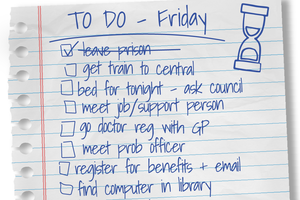Government backs crime-cutting bill to end Friday releases
Changes to help reduce reoffending by making sure vulnerable prison leavers get ample time to access vital support services will be introduced under a new bill that gained government support today (2 December).

- new law to significantly reduce Friday releases from prison moves closer to statute book
- bill to reduce reoffending by ending race against clock to secure vital support ahead of weekend
- hundreds of crimes to be prevented in boost to public safety
Around 1 in 3 prisoners leave prison on a Friday – giving them just a few short hours to find a bed for the night, register with a GP and sign up for job support before services close for the weekend.
This race against the clock can leave ex-offenders homeless and without support, increasing their chances of committing further crimes.
This is particularly true for ex-offenders with substance misuse problems, mental health issues or at real risk of homelessness. Ex-offenders with safe accommodation are around 50% less likely to slip back into a life of criminality.
Under Offenders (Day of Release from Detention) Private Members Bill, which passed second reading today, offenders scheduled for release on a Friday who also have mental health issues, substance misuse problems, or far to travel home will be released on Wednesday or Thursday instead, following strict security checks.
The bill was brought forward by Simon Fell MP and delivers on the government’s pledge Prisons Strategy White Paper, published in December last year.
Deputy Prime Minister, Lord Chancellor and Justice Secretary, Dominic Raab said:
Protecting the public is my top priority and we know access to housing, job support and substance misuse services are crucial in helping ex-offenders stay on the straight and narrow.
By ending Friday releases for certain prisoners we will reduce reoffending and cut crime, making our communities safer.
Prisons Minister, Damian Hinds, said:
Ending Friday releases for prisoners at risk of reoffending is a common-sense change that will ultimately result in less crime and fewer victims.
This is just the latest way in which we will drive down the £18 billion cost of reoffending, alongside tougher monitoring, better education and drug treatment.
The government has already made considerable progress in tackling stubborn reoffending rates, which have decreased over the past 10 years from 30.9% in 2009/10 to 25.6% in 2019/20.
The Prisons Strategy White Paper also outlines a package of sweeping reforms to skill up offenders to find work on release, tackle substance misuse problems and create 20,000 modern places in order to cut crime and keep the public safe.
This includes bolstering links between prisons and employers and ensuring prisoners can find work on release through a dedicated Prisoner Education Service to raise levels of literacy, numeracy, skills and qualifications.
Nacro chief executive, Campbell Robb, said:
Our campaign to end Friday prison releases was driven by the experience of our service users and our staff, and we are really pleased to see this small, but significant change one step closer to becoming law. For too long, Friday releases have been setting people up to fail.
Through this legislation, people with high resettlement needs will have that vital extra time during the working week to access the services they need – including securing housing, registering with a GP, meeting probation and accessing health services. This will give people the best chance at a second chance and play a role in helping to reduce reoffending.
Alongside this, prisons have also rolled out tough new security measures which have thwarted over 20,000 plots to smuggle drugs, phones, and weapons into prisons over the past 2 years. The department will invest £75 million a year by 2024/25 in expanding the use of alcohol monitoring tags and £780 million in treatment for offenders addicted to alcohol or drugs.
Notes to editors
- Early release would also apply to prisoners due to be released before a bank holiday
- The ultimate decision will be down to governors, who will have the discretion to agree to an earlier release date